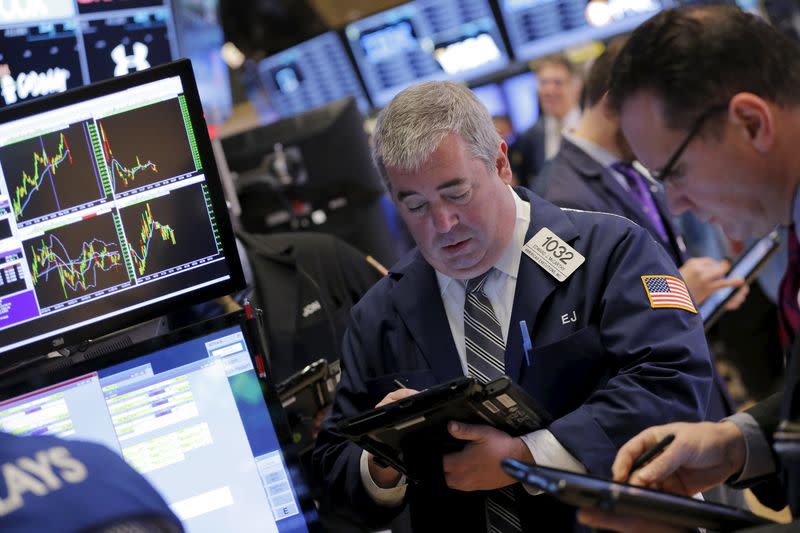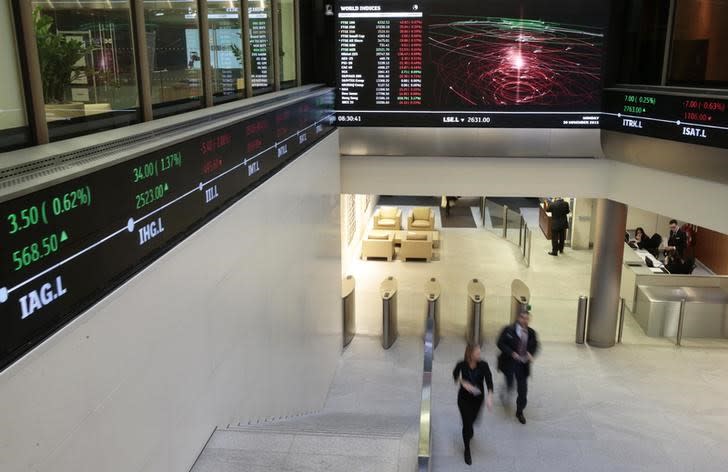Oil slumps anew, global equity markets fall
By David Gaffen
NEW YORK (Reuters) - Global stock markets fell on Wednesday as oil prices slumped toward 11-year lows, sapping investors' appetite for risky assets on the penultimate trading day of 2015.
Stock markets rallied the previous day as oil prices rebounded on prospects for lower temperatures on both sides of the Atlantic. But on Wednesday benchmark Brent crude slid below $37 a barrel (LCOc1), with investors worried about slowing demand and high supplies.
Slumping oil prices have been a major driver of financial markets this year, hammering energy companies, lowering inflation expectations and reinforcing bets on loose monetary policy in Europe and a slow tightening in the United States.
Wall Street closed lower, led by declines in energy shares. Apple Inc (AAPL.O), the most valuable public U.S. company, exerted the biggest drag on the Standard & Poor's 500 index, ending the day 1.3 percent lower, in what would be the stock's first down year since 2008.
The Dow Jones industrial average (.DJI) fell 0.66 percent to 17,603.87, the S&P 500 (.SPX) lost 0.72 percent at 2,063.36 and the Nasdaq Composite (.IXIC) dropped 0.8 percent to 5,065.85. With one day remaining in 2015, the S&P is up just 0.2 percent on the year.
The MSCI All World Index dipped 0.6 percent.
The pan-European FTSEurofirst 300 index (.FTEU3) fell 0.5 percent, while the euro zone's blue-chip Euro STOXX 50 index declined by 0.8 percent. Both gained in the previous session.
Crude prices have plunged by two-thirds since mid-2014 as soaring output from the Organization of the Petroleum Exporting Countries (OPEC), Russia and the United States led to a global surplus of half a million to 2 million barrels per day.
U.S. crude fell 2.8 percent to $36.82 a barrel, while Brent fell 2.8 percent to $36.72 a barrel, after an unusually large build in U.S. stockpiles; inventories rose 2.6 million barrels last week, the U.S. Energy Information Administration said.
Chris Jarvis, an analyst at Caprock Risk Management in Frederick, Maryland, called it "just another bearish data point in a series of many that have dominated 2015 and will likely continue to do so heading into 2016."
The Japanese yen, a safe haven currency, inched up to 120.50 yen (JPY=) per dollar. The dollar was 0.1 percent higher against a basket of major currencies (.DXY).
China's yuan held steady at 6.566 per dollar, after hitting its weakest in over four years in offshore trading.
The Nikkei index (.N225) ended Japan's final trading day of the year up 0.3 percent, off session highs but still 9.1 percent stronger for 2015.
Benchmark U.S. Treasuries were little changed, with the 10-year Treasury yielding 2.29 percent.
On the last trading day of 2015 for European bond markets, 10-year German Bund yields were flat at 0.63 percent and up nearly 10 basis points on the year.
Gold ticked higher, with gains capped by weaker oil, although the metal remained on track for a third successive yearly fall.
(Additional reporting by Jemima Kelly, Sudip Kar-Gupta and Patrick Graham in London, and Lisa Twaronite in Tokyo; Editing by Nick Zieminski and Richard Chang)



